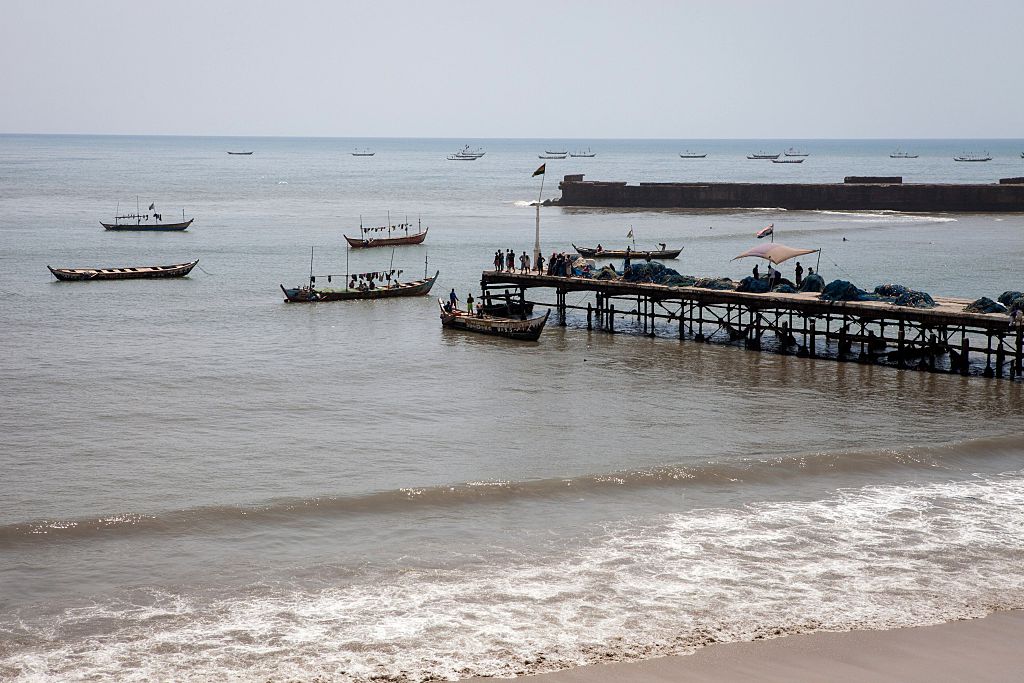Industrial Fleets Plunder Ghanaian Waters, Driving Food Insecurity
ADF STAFF
Beatrice Otoo has been a fish processor in Accra, Ghana, for 20 years.
Thanks to the unrelenting presence of industrial fishing vessels in Ghanaian waters, her once-thriving business is drowning.
“The market has gone down,” Otoo told Ghana Web. “People don’t buy or patronize our fish as they used to because they claim they are expensive and that living conditions are hard. Besides that, fish is scarce to get nowadays. Previously, we used to buy fish from the local artisanal fishermen, but now the fishermen don’t bring in fish. What they bring are insufficient for the market.”
Like many who work in Ghanaian fisheries, Otoo blames Chinese fishing vessels for scooping up most of the fish, much of which is exported to Asia. However, sometimes Chinese vessels engaged in illegal fishing sell fish back to local communities — at high prices — where livelihoods and food security have been undermined.
Ishmael Aryee has been an artisanal fisherman for almost 25 years. Aryee told Ghana Web that the Chinese fishing vessels often use nets with mesh sizes below legal standards, allowing them to catch indiscriminate amounts and types of fish. When Aryee started fishing with his father, they caught large amounts of a variety of fresh fish daily, but he said those days are over.
Artisanal fisherman Oko Aryee said the Chinese trawlers typically fish in unauthorized zones and use lights to attract fish.
“In the process they extract juvenile fish that should have been allowed to grow more,” Aryee told Ghana Web. “I can say we are doomed if nothing is done about the situation. There is need for an urgent solution.”
An investigation by the Environmental Justice Foundation found that 90% of industrial fishing vessels operating in Ghana are owned by Chinese companies, often through disguised front companies. Ghana loses $50 million a year through opaque arrangements with foreign companies, the foundation found.
The results of overfishing in Ghana have been catastrophic.
More than 100,000 fishermen and 11,000 canoes operate in the country, but average annual income has dropped by as much as 40% per artisanal canoe in the past 15 years, according to the foundation.
Ghana’s small pelagic fish populations, such as sardinella, have dropped 80% in the past two decades. One species, sardinella aurita, is fully collapsed, the foundation reported. Dwindling fish stocks have caused prices to soar and driven food insecurity.
About 20% to 40% of Ghana’s population is food insecure, Richmond Aryeetey, an associate professor at the University of Ghana’s School of Public Health, told Ghana Web in October.
This year, Ghana drafted a new National Integrated Maritime Strategy that aims to ensure that its maritime domain will be safe and its blue economy thriving by 2040.
Officials drafted the strategy after consultations with state agencies and departments; local private entities, including those with fisheries and environmental interests; commercial and non-commercial maritime actors; and experts and international partners, among others.
It was developed with support from the Centre for Maritime Law and Security and the United Nations Office on Drugs and Crime with funding from Denmark.
“This will mark a major milestone in our endeavor to build a sustainable blue economy,” Ghanaian President Nana Addo Dankwa Akufo-Addo said in a report by Business Ghana.


Comments are closed.